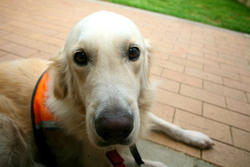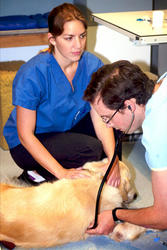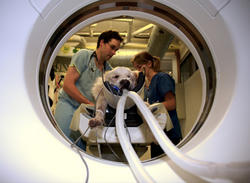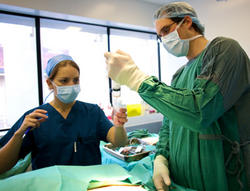
|



|
| ADICELLâ„¢: STEM CELL PROCEDURE FOR DOGS WITH ARTHRITIS |

|
 |
|
Worldwide media reports about stem cell therapies are becoming commonplace as stem cell applications are being pursued in diverse areas including cardiology, orthopaedics, oncology and internal medicine. One area in which stem cell technologies are advanced is in the treatment of osteoarthritis in dogs. Statistics show 1 in 5 dogs suffer from osteoarthritis, a chronic, painful and debilitating disease for which there is no known cure. Regeneus, in collaboration with Ku-Ring-Gai Veterinary Hospital, has pioneered a commercial application, which contains adult mesenchymal stem cells and associated cell populations derived from fatty tissue deposits. The procedure, known as AdiCell™, is being utilised to treat dogs with arthritis and is already demonstrating very promising results. AdiCell is a regenerative procedure for arthritic dogs, which utilises the body's own ability to heal itself. This safe technology is being used to heal painful arthritic joints such as knees and hips, and has also been successfully used to treat dogs with hip dysplasia. It has been shown to lessen pain, reduce reliance on medication and improve the general wellbeing of dogs that had previously struggled to walk, run, and get in and out of the car. As the name suggests, AdiCell utilises the dog's own fat cells which carries no risk of rejection. Fat or adipose tissue is used for its abundant supply of adult mesenchymal stem cells. These stem cells are also easier to harvest, unlike bone marrow stem cells, which are extracted from the hipbone during complex surgery. Recent results from Regeneus' research, have demonstrated that adult adipose-derived cell populations secrete proteins that are known to have potentially powerful anti-inflammatory capabilities. Associate Professor Ben Herbert and PhD student Michael Medynskyj have identified a cocktail of proteins that are known from published studies to down regulate various stress markers in cells around them. The AdiCell one-day procedure is made up of four distinct processes:
1. Veterinarian Health & Wellbeing Assessment
- A complete veterinary history and examination
- Neurological examination
- Orthopaedic examination and scoring
- Full Blood and urine testing including CK, T4, ANA and RF antibody testing
- Diagnostic imaging including high definition CT Scanning to help reduce imaging time, significantly increase joint detail, and rule out pre-existing surgical lesions
- Joint fluid cytology and culture and sensitivity, or synovial biopsy where indicated
- Gait analysis
2. Adipose Tissue ExtractionRemoval of adipose tissue is carried out under general anaesthetic and is performed either via removal of the inguinal fat pad or via liposuction. Once the adipose tissue-derived material is harvested (15 to 20 grams of fat), the joints requiring implantation are shaved and the dog is removed from general anaesthetic and receives further levels of opiate as required.
3. Isolation of an adult stem cell-containing cell population
The adipose tissue is processed using a procedure that takes less than one hour. The cell population contains a mixture of various cell types including adult mesenchymal stem cells and their derivatives. 4. Transplantation of autologous cells
The patient is lightly re-anaesthetised and the joints are surgically prepared. Transplantation is performed via a standard injection for each joint. Joint fluid is aspirated to ensure correct placement before the cells are injected. Up to 12 joints have been treated in the one procedure. |

|
 |
| Checking Patient |
AdiCell Results During clinical trials, 33 dogs that received AdiCell treatment for arthritic joints were assessed prior to, and after treatment. The assessment involved a veterinary assessment prior to treatment, an assessment at 10 days and monthly intervals for 6 months. The examination involved scoring for lameness, range of motion, functional disability, pain on manipulation, proprioception, swelling and ability to climb stairs and to jump.
Within 10 days of being treated with AdiCell, some arthritic dogs showed a significant and in certain cases, a dramatic improvement in mobility. At the six-month point, results showed all dogs that suffered from osteoarthritis and joint pain, improved after the AdiCell treatment. All 33 dogs showed improvement in mobility in their arthritic joints. The improvements ranged from 53% better mobility, which represents the worst result, to 100% improvement. Average mobility improvement is 84%. An independent survey with dog owners confirmed these results. Dog owners' total satisfaction rate was 97%, three months after AdiCell. Results show 100% of dog owners consider the severity of their dogs' arthritis had decreased after AdiCell. From pre treatment to six months post AdiCell, pet owners rated their dogs as follows:
- Pre treatment: low end of very severe arthritis
- 10 days post AdiCell: very strong arthritis
- 2, 4 and 6-month point: mild arthritis
There are a number of possibilities as to why AdiCell produces such dramatic improvements, including the molecules produced by the transplanted stem cells leading to anti-inflammatory effects, and the local environment being stimulated to generate new cartilage via the transplanted cell population and/or the resident cells of the synovial sac (thin tissue that lines the joint). |

|
 |
| CT Scan Preparation |
Recent molecular breakthroughs in permanent cell labelling technologies now allow for the unambiguous tracking of cells. When adult mesenchymal stem cells are transplanted into damaged joints, the cells are observed to embed into the surrounding tissue and to generate new cartilage (Murphy, Fink et al. 2003), (Wakitani, Goto et al. 1994). Beyond the risks of anaesthesia, fat harvest site bruising and irritation, as well as the minimal risk of infection in the harvest or implantation site, the AdiCell procedure is well tolerated by animals. |

|
 |
| Fat Cells Removed |
Most dog owners are generally surprised at the degree of recovery the day after the procedure. If a surgical fat pad excision is required, the harvest wound is usually bruised and in some cases swollen. However, this rarely creates problems for the dog. Of the 90 cases treated to date, only three dogs have shown no signs of improvement and no dogs have had their condition worsened by the procedure.
AdiCell is only currently available at Ku-Ring-Gai Veterinary Hospital in North Turramurra, Sydney. The procedure will be available nationally in the coming months. |

|

|

|
| Regeneus Animal Health |
| For more information visit www.regeneus.com.au or call (02) 9089 8740 |
| Web:
www.regeneus.com.au |

|
|
| Last Update: 28/07/09 12:51 |
Views: 10276 |
|

|